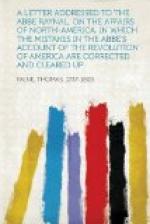It is yet too soon to write the history of the revolution; and whoever attempts it precipitately, will unavoidably mistake characters and circumstances, and involve himself in error and difficulty. Things like men are seldom understood rightly at first sight. But the Abbe is wrong even in the foundation of his work; that is, he has misconceived and misstated the causes which produced the rupture between England and her then colonies, and which led on, step by step, unstudied and uncontrived on the part of America, to a revolution, which has engaged the attention, and affected the interest of Europe.
To prove this, I shall bring forward a passage, which, though placed towards the latter part of the Abbe’s work, is more intimately connected with the beginning: and in which, speaking of the original cause of the dispute, he declares himself in the following manner—
“None,” says he, “of those energetic causes, which have produced so many revolutions upon the globe, existed in North-America. Neither religion nor laws had there been outraged. The blood of martyrs or patriots had not there streamed from scaffolds. Morals had not there been insulted. Manners, customs, habits, no object dear to nations, had there been the sport of ridicule. Arbitrary power had not there torn any inhabitant from the arms of his family and friends, to drag him to a dreary dungeon. Public order had not been there inverted. The principles of administration had not been changed there; and the maxims of government had there always remained the same. The whole question was reduced to the knowing whether the mother country had, or, had not a right to lay, directly or indirectly, a slight tax upon the colonies.”
On this extraordinary passage, it may not be improper, in general terms, to remark, that none can feel like those who suffer; and that for a man to be a competent judge of the provocative, or, as the Abbe styles them, the energetic causes of the revolution, he must have resided in America.
The Abbe, in saying that the several particulars he has enumerated did not exist in America, and neglecting to point out the particular period in which the means they did not exist, reduces thereby his declaration to a nullity, by taking away all meaning from the passage.
They did not exist in 1763, and they all existed before 1776; consequently as there was a time when they did not, and another when they did exist, the time when constitutes the essence of the fact; and not to give it, is to withhold the only evidence which proves the declaration right or wrong, and on which it must stand or fall. But the declaration as it now appears, unaccompanied by time, has an effect in holding out to the world, that there was no real cause for the revolution, because it denied the existence of all those causes which are supposed to be justifiable, and which the Abbe styles energetic.




